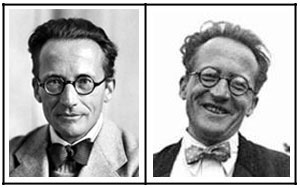Erwin Schrödinger
Erwin Rudolf Josef Alexander Schrödinger (1887-1961), an Austrian physicist, made important contributions in the field of physics, especially the Schrödinger equation, resulted in his being awarded the Nobel Prize in Physics (1933). Two years later he proposed the thought experiment known as Schrödinger's cat, famous among physicists. He also wrote on philosophy and theoretical biology. In January 1926, Schrödinger published “Quantization as an Eigenvalue Problem” on wave mechanics and what is now known as the Schrödinger equation. His derivation of the wave equation for time independent systems provided correct energy eigenvalues for the hydrogen-like atom. Schrödinger’s revolutionary quantization paper has been universally celebrated as one of the most important achievements of the twentieth century. In 1927 he succeeded Max Planck at the
Friedrich Wilhelm University in Berlin. In 1933 Schrödinger left Germany due to the current wave of Nazis
anti-semitism. He became a Fellow of Magdalen College at the University of Oxford and received the Nobel Prize with
Paul Dirac. Due to his unconventional personal life (he lived with two women), Schrödinger left his position
at Oxford (1934) and lectured at Princeton University. He was offered a permanent position at Princeton, but
did not accept it (probably related to the thorny issue of setting up house with his wife and mistress). In
1936 Schrödinger took up a position at the University of Graz in Austria. z
|
